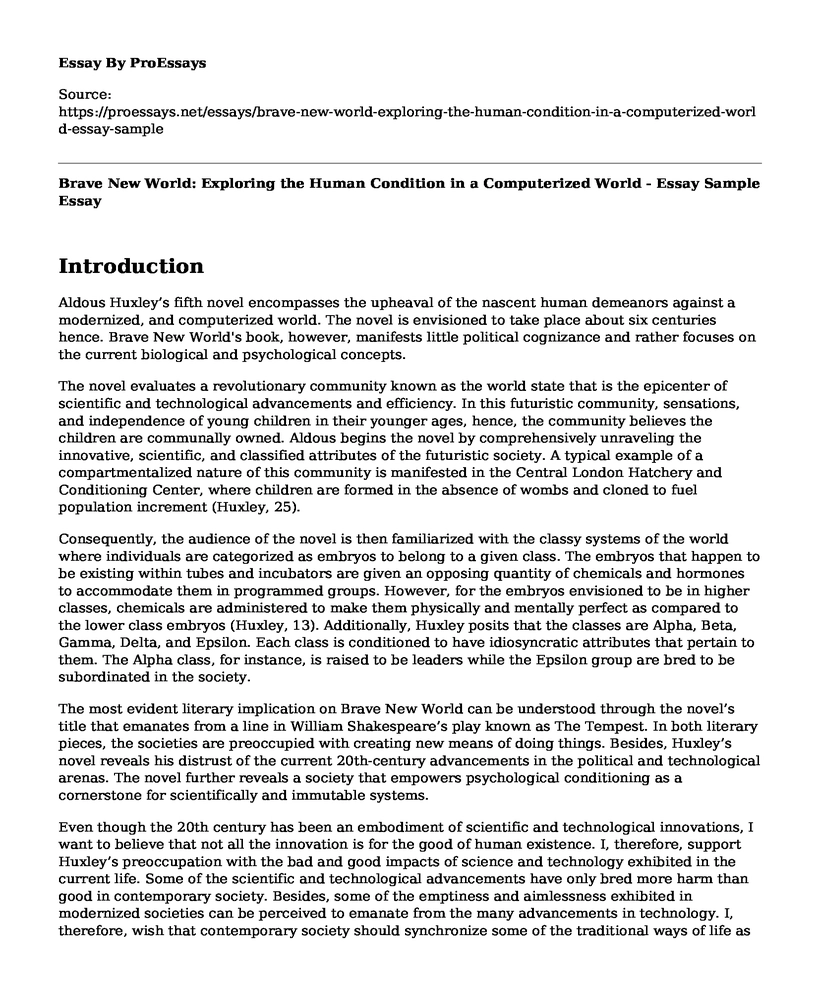Introduction
Aldous Huxley’s fifth novel encompasses the upheaval of the nascent human demeanors against a modernized, and computerized world. The novel is envisioned to take place about six centuries hence. Brave New World's book, however, manifests little political cognizance and rather focuses on the current biological and psychological concepts.
The novel evaluates a revolutionary community known as the world state that is the epicenter of scientific and technological advancements and efficiency. In this futuristic community, sensations, and independence of young children in their younger ages, hence, the community believes the children are communally owned. Aldous begins the novel by comprehensively unraveling the innovative, scientific, and classified attributes of the futuristic society. A typical example of a compartmentalized nature of this community is manifested in the Central London Hatchery and Conditioning Center, where children are formed in the absence of wombs and cloned to fuel population increment (Huxley, 25).
Consequently, the audience of the novel is then familiarized with the classy systems of the world where individuals are categorized as embryos to belong to a given class. The embryos that happen to be existing within tubes and incubators are given an opposing quantity of chemicals and hormones to accommodate them in programmed groups. However, for the embryos envisioned to be in higher classes, chemicals are administered to make them physically and mentally perfect as compared to the lower class embryos (Huxley, 13). Additionally, Huxley posits that the classes are Alpha, Beta, Gamma, Delta, and Epsilon. Each class is conditioned to have idiosyncratic attributes that pertain to them. The Alpha class, for instance, is raised to be leaders while the Epsilon group are bred to be subordinated in the society.
The most evident literary implication on Brave New World can be understood through the novel’s title that emanates from a line in William Shakespeare’s play known as The Tempest. In both literary pieces, the societies are preoccupied with creating new means of doing things. Besides, Huxley’s novel reveals his distrust of the current 20th-century advancements in the political and technological arenas. The novel further reveals a society that empowers psychological conditioning as a cornerstone for scientifically and immutable systems.
Even though the 20th century has been an embodiment of scientific and technological innovations, I want to believe that not all the innovation is for the good of human existence. I, therefore, support Huxley’s preoccupation with the bad and good impacts of science and technology exhibited in the current life. Some of the scientific and technological advancements have only bred more harm than good in contemporary society. Besides, some of the emptiness and aimlessness exhibited in modernized societies can be perceived to emanate from the many advancements in technology. I, therefore, wish that contemporary society should synchronize some of the traditional ways of life as a means of rejuvenating the fading love for humanity within communities. I, therefore, recommend Aldous Huxley’s point of view of the contemporary society that crusades for change more so in the scientific and technological aspects of life.
Work Cited
Huxley, Aldous. Brave new world. Ernst Klett Sprachen, 2007.
Cite this page
Brave New World: Exploring the Human Condition in a Computerized World - Essay Sample. (2023, Aug 09). Retrieved from https://proessays.net/essays/brave-new-world-exploring-the-human-condition-in-a-computerized-world-essay-sample
If you are the original author of this essay and no longer wish to have it published on the ProEssays website, please click below to request its removal:
- Essay Example - Lack of Meaningful Relationship
- Essay on the Norton's Anthology of Drama
- Was Creon Right in Condemning Antigone? Essay Example
- The Portrayal of Human Love in the Poem Lady Mary Wroth's Pamphilia to Amphilanthus
- Modern Romantic in Music - Essay Sample
- Literary Analysis Essay on A Country Doctor
- Paper Example on Exploring the Echoes of Emerson and Thoreau in Whitman







